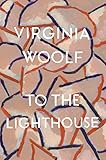 Reading Virginia Woolf—whether you can, whether the reading is excruciating or transporting—is about finding your sea legs. Woolf’s prose sets you adrift in other minds, their unfamiliar eddies of fear, desire, and despair, their private emotional rhythms and associations. You have to surrender yourself to Woolf, let yourself be swept along—sometimes bemused, sometimes moved, sometimes uncomprehending—in the tides of other consciousnesses. All this is true in Mrs. Dalloway as well, but To the Lighthouse intensifies these effects: it spans a decade instead of a day; it permeates so many minds and moves between them so fluidly, so swiftly. It’s easy to lose track of whose mind you’re listening to, whose words you’re hearing, who’s being spoken about. But in this is also something ghostly and god-like: you drift, as if disembodied, into the minds of others, through the rooms of the Ramsay family’s summer house on the Isle of Skye; you hear snatches of conversation from the drawing room, wisps of another conversation on the lawn. The plot of the novel, such as it is, is diffuse and amorphous; By the standards of most 18th and 19th century novels, it’s not really a plot at all. In the novel’s famous second section, “Time Passes,” you are quite literally watching weeds and rabbits overtake the garden.
Reading Virginia Woolf—whether you can, whether the reading is excruciating or transporting—is about finding your sea legs. Woolf’s prose sets you adrift in other minds, their unfamiliar eddies of fear, desire, and despair, their private emotional rhythms and associations. You have to surrender yourself to Woolf, let yourself be swept along—sometimes bemused, sometimes moved, sometimes uncomprehending—in the tides of other consciousnesses. All this is true in Mrs. Dalloway as well, but To the Lighthouse intensifies these effects: it spans a decade instead of a day; it permeates so many minds and moves between them so fluidly, so swiftly. It’s easy to lose track of whose mind you’re listening to, whose words you’re hearing, who’s being spoken about. But in this is also something ghostly and god-like: you drift, as if disembodied, into the minds of others, through the rooms of the Ramsay family’s summer house on the Isle of Skye; you hear snatches of conversation from the drawing room, wisps of another conversation on the lawn. The plot of the novel, such as it is, is diffuse and amorphous; By the standards of most 18th and 19th century novels, it’s not really a plot at all. In the novel’s famous second section, “Time Passes,” you are quite literally watching weeds and rabbits overtake the garden.
Woolf’s writing can feel disconcerting, confusing, and frustrating; It can also seem numinous, exquisite, utterly absorbing. For myself, I have found that Woolf is not an author I can will my way though. There are times when I find her stream-of-consciousness techniques coy, contrived, pointlessly difficult and comprehension-thwarting—when I find the lack of a substantial plot unbearable. Then, I find myself of Cyril Connolly’s opinion that Woolf, “seemed to have the worst defect of the Mandarin style, the ability to spin cocoons of language out of nothing.”
At other times, the drifting, liquid rhythms of Woolf’s prose, her approximation of the currents of the psychic seascape, feel intuitively right, more natural and true than anything else I’ve read, and I find myself of Connolly’s mind again: “The Waves,” he wrote in The Enemies of Promise, “is one of the books which comes nearest to stating the mystery of life, and so, in a sense, nearest to solving it.”
More Difficult Books








